Introduction
The black Golden Retriever is a truly captivating and rare find in the world of dogs. This beautiful breed is often the result of a unique blend of canine lineage that can sometimes include breeds like the Flat-Coated Retriever and even the Labrador. While some may assume that the black Golden Retriever is a regular variety of Golden Retriever, the truth is that they are an extraordinary anomaly that sets them apart.
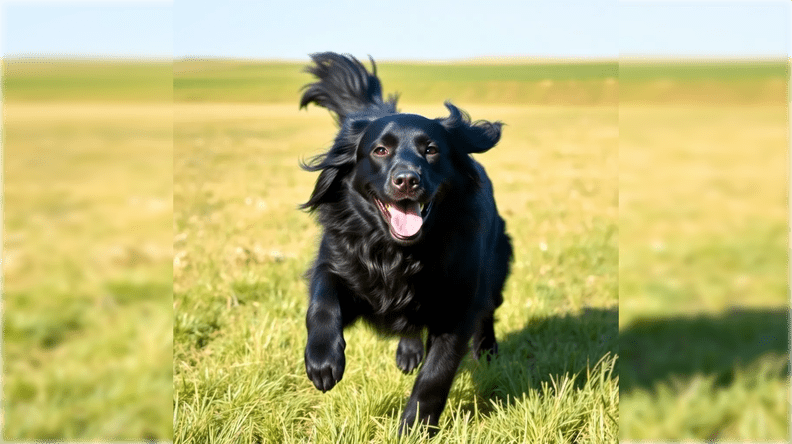
Many dog lovers have stumbled upon this breed by accident, only to discover the secret behind its fascinating world. The black Golden Retriever is likely the result of a genetic mutation, a hidden treasure of the dog world waiting to be unveiled. Whether you’re drawn to their sleek, dark coats or their friendly, loyal nature, there’s no denying that these Retrievers are one of the most interesting breeds you’ll come across.
Key Takeaways
When you hear the term black Golden Retriever, it’s important to know that it’s often misleading. Purebred Golden Retrievers do not typically come in black due to their genetic traits, making the black Golden Retriever a rarity. If you come across a dog labeled as such, it’s likely a Flat-Coated Retriever, a Labrador, or even a mixed breed.
While these dogs may have similar physical features to the black Golden Retriever, the reality is that other breeds, like Labradors and Flat-Coated Retrievers, can sometimes appear to be a close match in terms of coat color and structure. It’s essential to recognize that the unique blend of breeds can sometimes result in a dog that looks like a black Golden Retriever, but may not be a true representation of the breed.
Do Black Golden Retrievers Exist? Science Explains
The idea of a black Golden Retriever is often a fascinating story for dog lovers, but the reality behind it lies in a complex interplay of genetics. Golden Retrievers are known for their iconic golden color, which is governed by a set of genes responsible for their familiar golden hue. This specific color is a result of eumelanin, the pigment that gives dogs their light shade. However, the gene variants responsible for the black coat color are absent in purebred Golden Retrievers, making it impossible for them to inherit a black coat naturally.
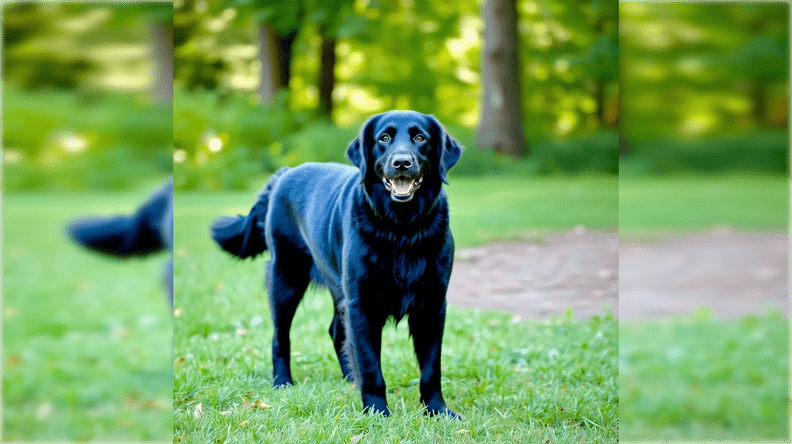
In theory, a purebred black Golden Retriever cannot exist because recessive alleles for the black coats would need to be present in the genetic makeup, which is not the case. While certain dogs may appear to have a black coat color, they often come from different breeds, such as Labradors or Flat-Coated Retrievers, which carry the eumelanin-producing genes responsible for darker hues. So, while the genes for a black Golden Retriever may be present in some mixes, it’s not something you’d find in a purebred Golden Retriever.
The Earliest Records of Black Golden Retrievers in History
The history of the Black Golden Retriever is rooted in the United Kingdom, particularly in Scotland and England. The first signs of black-coated retrievers date back to 1868 when a Scottish man bred a black wavy-coated retriever. This dog was part of a mix of several breeds, including the Flat-coated Retriever and the Labrador Retriever. These early records show that these dogs were often part of a litter that contained yellow puppies, but some also had a black coat, which was the result of recessive genes passed down through generations.
Interestingly, the black coat wasn’t the most common feature, but it appeared in a line of retrievers bred for their hunting skills, specifically to retrieve downed waterfowl. These dogs were energetic, loyal, and known for their ability to accompany hunters on trips. Breeders continued to cross these retrievers with breeds like the sandy-colored Bloodhound and the Tweed water spaniel, refining the traits over several generations. However, the focus on a black coat remained rare, as the breed was primarily aimed at producing the popular purebred AKC-registered retrievers.
See also: Long Haired Dachshund
As time went on, the breeding authorities decided to continue developing the retriever breed, but the black Golden Retriever was overshadowed by the growing popularity of the iconic yellow retrievers. The black-colored dogs were still part of the ancestry lineage, though. While there were some mentions of these flat-coated Black Retrievers, the demand for them as a new dog breed never quite matched the demand for the other color variations, especially with the purebred AKC-registered status being more sought after in the dog world.
Why Is it Impossible To Get A Black Golden Retriever?
The reason it’s impossible to get a black Golden Retriever lies in the genetics of the breed. A true representation of a Golden Retriever simply does not include a black coat due to the specific genetic traits that define the breed. While it’s likely that some black-coated dogs are mistakenly referred to as black Golden Retrievers, they usually belong to another breed, like the Flat-Coated Retriever or Labrador Retriever, or are simply mixed-breed dogs. These breeds, unlike the Golden Retriever lineage, can have black coats, but it’s important to remember that a black coat is not part of the natural genetics of the Golden Retriever breed.
Is a Black Golden Retriever Rare?
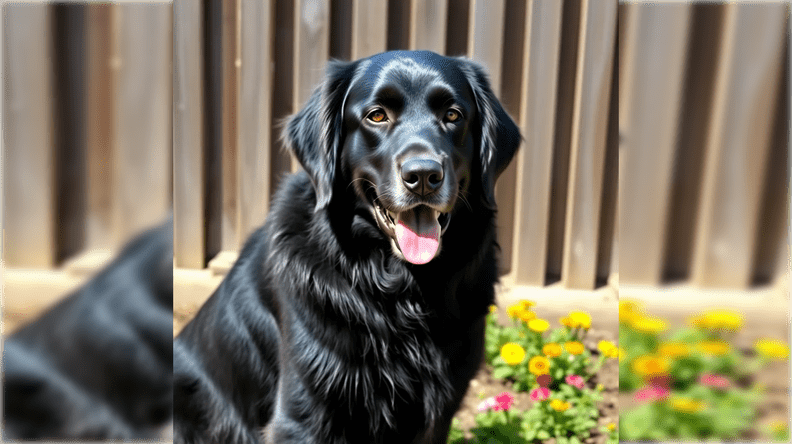
The concept of a black Golden Retriever often sparks imagination, but in reality, it’s highly improbable due to the way science and genetics work. A purebred Golden Retriever is defined by its genetic makeup, which does not include a black coat. Instead, these dogs are known for their golden hue, which is deeply ingrained in the breed’s defining characteristics. While the idea of a black Golden Retriever may seem intriguing, the reality is that it does not exist within the breed, making it a rare and misleading concept. The Golden Retriever remains one of the most beloved and iconic dogs in the world, known for its beautiful golden coat.
What Dogs Could Look Like Black Golden Retrievers
Flat-Coated Retriever: Similar in appearance to the Golden Retriever, this breed has a solid black coat, which can lead to confusion with a black Golden Retriever.
Black Labrador Retriever: Known for its striking resemblance to Golden Retrievers in size and demeanor, Black Labs share a friendly nature but come with a solid black coat.
Newfoundland: This breed is larger and heavier than the Golden Retriever but has a solid black coat that could be mistaken for a black Golden Retriever from a distance.
Golden Retriever Mix: A mix with a non-Golden Retriever parent (like a Labrador Retriever or Newfoundland) could have coat colors and patterns that resemble a black Golden Retriever.
Gordon Setter: Known for its stunning black and tan coat, the Gordon Setter can sometimes be mistaken for a black Golden Retriever due to similar physical characteristics.
Belgian Sheepdog: This breed has a solid black coat and shares some physical traits with retrievers, but it is more reserved and known for its herding instincts.
Rottweiler Mix: A Rottweiler Mix with Rottweiler ancestry might carry the black coat gene, leading to a dog that resembles a black Golden Retriever, though their personalities can vary widely.
How Black Golden Retrievers Gained Popularity
In the 19th century, the Golden Retriever became widely admired for its athletic build and affectionate temperament, becoming a favorite among dog owners worldwide. However, the appearance of Black Golden Retrievers sparked a new level of fascination due to their unique-looking stark black coat. The genetic mutation that led to this rare color became a topic of curiosity and excitement, though many mistakenly confused them with other black-coated breeds. Despite this, the distinct color mutation began to be sought out for its striking difference from the original Golden Retriever.
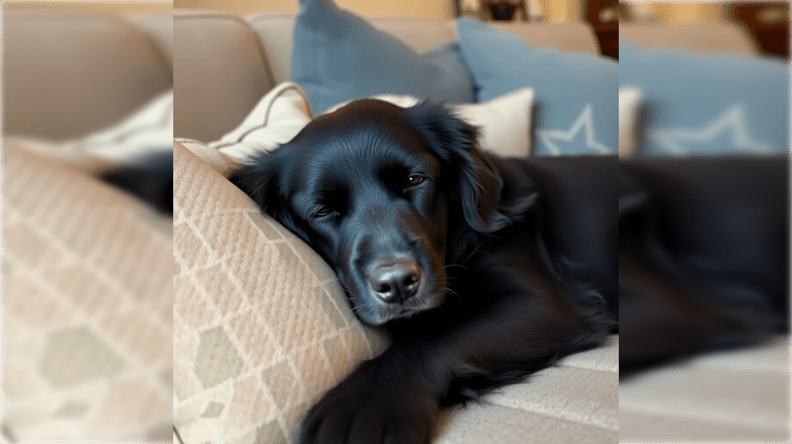
The popularity of the Black Golden Retriever grew over time, especially with breeders selecting for this unique coat coloration. With husbandry requirements being met, the coloration became more consistent, leading to a growing demand. Whether it had long, short, wavy, or straight hair, the shiny coat of the black variation added to its appeal. As interest continued to rise, more dog enthusiasts admired the unique aesthetic of these animals, solidifying their place in the Golden Retriever family.
Over time, these dogs’ growing popularity was fueled by their distinctiveness and the joy of having a Golden Retriever with a black coat. As more people looked for pets that stood out, the Black Golden Retriever became a favored choice, marking a fascinating chapter in the world of dog breeding.
Golden Retriever vs. Flat-Coated Retriever: Key Points Explained
- Coat:
- Golden Retriever: The coat of a Golden Retriever is dense and water-repellent, designed to protect the dog while swimming or in wet conditions. Their coat is typically golden, but it can vary in shade, from light cream to deep gold, depending on the individual. The texture and thickness require regular grooming to keep it healthy and free of tangles.
- Flat-Coated Retriever: The Flat-Coated Retriever has a sleek and glossy coat that lies flat against its body, giving it a smooth and elegant look. The coat typically comes in solid black, liver-colored, or sometimes a reddish-brown hue, which is different from the golden tones of the Golden Retriever. The Flat-Coat’s coat needs brushing to maintain its glossy appearance but is generally easier to manage compared to the Golden’s thicker, double-layered coat.
- Appearance:
- Golden Retriever: Golden Retrievers have a strong, muscular, and well-balanced body. Their expressive face shows their friendly and approachable personality. Their medium-sized pendant ears add to their gentle and charming expression. These dogs look sturdy and athletic, built for action while maintaining an easy-going nature.
- Flat-Coated Retriever: The Flat-Coated Retriever is leaner and more elegant. Their elegant head and expressive dark eyes make them look sophisticated. Like Golden Retrievers, they have pendant ears, but their overall build is less stocky and more graceful, giving them a slightly different look despite having similar friendly features.
- Temperament:
- Golden Retriever: Known for their gentle and friendly demeanor, Golden Retrievers are highly social dogs that enjoy the company of humans, children, and other pets. Their calm, tolerant nature makes them ideal for families. They are also eager to please, which makes them highly trainable and responsive to commands.
- Flat-Coated Retriever: These dogs are equally friendly and outgoing, but they tend to have a more goofy, exuberant, and cheerful personality. They love to play and are often seen as the “clowns” of the retriever family. This makes them highly entertaining and full of joy, although their liveliness can sometimes be overwhelming.
- Activity and Exercise:
- Both breeds are active dogs that need regular exercise to maintain their health and happiness. They enjoy outdoor activities like fetch, swimming, and long walks. Their high energy levels mean they require daily physical exercise, as well as mental challenges to keep them stimulated. These dogs thrive in environments where they can engage in various activities to burn off their energy and remain fit.
- Golden Retrievers and Flat-Coated Retrievers both excel in activities that require agility, strength, and intelligence. Whether it’s a game of flyball, obedience training, or simply a game of fetch, they need regular mental stimulation to prevent boredom. Their natural intelligence and eagerness to please make them quick learners in training sessions.
- Grooming Needs:
- Golden Retriever: Due to their dense coats, Golden Retrievers require regular grooming to prevent matting and reduce shedding. This includes brushing their fur several times a week and giving them baths every few weeks to keep their coats clean and shiny. The shedding can be significant, especially during seasonal changes, so consistent grooming is important.
- Flat-Coated Retriever: Although they have a shorter and less dense coat, Flat-Coated Retrievers still require regular grooming to keep their coat glossy and free of tangles. Their coat is easier to manage than the Golden Retriever’s, but it still requires brushing to maintain its luster. They shed less than Golden Retrievers, making them slightly lower maintenance when it comes to grooming.
Comparison in Points Explained:
- Coat Type:
- Golden Retrievers have a thicker double coat, which provides more insulation and requires more maintenance. In contrast, Flat-Coated Retrievers have a shorter, sleeker coat, which is easier to care for but still needs attention to maintain its shine.
- Build and Appearance:
- The Golden Retriever is built for strength and endurance, making them appear more muscular and robust. The Flat-Coated Retriever, while still athletic, has a leaner build, which gives them a more elegant and graceful look, although both breeds have similarly friendly and approachable expressions.
- Temperament and Personality:
- Both breeds are friendly and love to be around people, but the Flat-Coated Retriever is often more exuberant and goofy, making them the life of the party. Golden Retrievers tend to be more composed and gentle, offering a balance of playfulness and calm.
- Exercise Needs:
- Both dogs thrive on exercise, but they require consistent physical and mental stimulation. Golden Retrievers might be a bit more steady, while Flat-Coated Retrievers are known for their enthusiasm and energy levels, often pushing their owners to be more active.
- Grooming and Maintenance:
- Golden Retrievers require more regular grooming due to their dense, shedding coat. Flat-coated retrievers, with their shorter coat, are easier to manage, though they still require brushing to maintain their signature shine.
Formal Recognition of Black Golden Retrievers
The American Kennel Club (AKC) does not officially recognize the Black Golden Retriever as a valid color form of the Golden Retriever breed. According to the AKC standard, a Golden Retriever should have a rich, lustrous golden coat that comes in varying shades, but it disallows extremely light or dark coats. The black Golden Retriever is considered a polluted genetic mutation of the purebred Golden Retriever, meaning it is not officially accepted within the breed’s standard. Despite this, many Golden Retriever clubs continue to include black Golden Retrievers if their bloodline closely matches that of the Golden Retriever breed, often citing historical ties to the breed’s genetic traits.
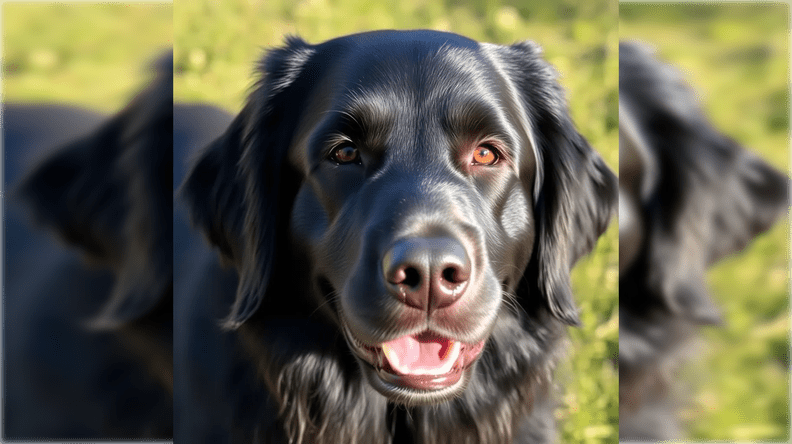
Though the AKC does not officially recognize the black variation, the bloodline connection to the Golden Retriever remains significant for those interested in the breed’s history. The black Golden Retriever typically emerges from a genetic mutation, and while it shares many of the same traits as the traditional Golden Retriever, including coat color variations and a similar temperament, it is not officially acknowledged by the AKC standard for the retriever breed.
Finding a Black Golden Retriever
Finding a black Golden Retriever can be tricky because this coat color is rare in purebred Golden Retrievers. The black coloration typically results from a genetic mutation. While you might come across dogs that resemble Golden Retrievers, they could be Flat-Coated Retrievers or Golden Retrievers mixed with black coats.
Points to Remember:
- Genetic Mutation: Black coat color in Golden Retrievers is not standard and is caused by a genetic mutation.
- Not Purebred: A black Golden Retriever may not be purebred; it could be a Golden Retriever Mix or a Flat-Coated Retriever.
- Flat-Coated Retrievers: These dogs can also have black coats and are sometimes mistaken for black Golden Retrievers.
- Reputable Breeders: Finding a reputable breeder who understands the genetic traits and history of the breed is essential.
- Rescue Organizations: Shelters and rescue organizations can be a good place to adopt mixed-breed Golden Retrievers with black coats.
- Adoption Option: Adoption is an option if you’re willing to be patient and ensure the dog’s health and well-being.
To find a black Golden Retriever, consider adopting or working with a reputable breeder. Although rare, these dogs can be found through rescues, shelters, or by networking with Golden Retriever clubs and breed enthusiasts. Whether you adopt or buy, focusing on your dog’s health and temperament is key to ensuring a happy and healthy companion.
Top 5 Unique Facts About Black Golden Retrievers
1. Genetic Mutation
The Black Golden Retriever is the result of a genetic mutation that causes the dog to have a black coat, unlike the traditional Golden Retriever. This mutation can occur within the breed’s bloodline, and while the dog still shares the Golden Retriever lineage, the black coat is not typical. Over the generations, mixed breeding or rare genetic traits can produce this distinct coat color, making these dogs an unusual find among other dog breeds.
2. Brains and Strength
The Black Golden Retriever inherits the energetic and loyal temperament of a typical Golden Retriever, making it both smart and easy to train. Despite the striking black coat resulting from a genetic mutation, these dogs still share the same glamorous appearance and strong, agile nature. Their smart behavior and quick learning abilities make them popular, and their energetic drive ensures they excel in various tasks, from fetching to agility training.
3. Rarity
The Black Golden Retriever is a rare find, as its black coloration is not typical for the breed. Most Golden Retrievers are known for their golden hues, making these specimens stand out due to their unique look. The black coat is a result of a genetic mutation, further adding to their rarity and distinctiveness.
4. Flat-coated or Golden Retriever?
The black coloration of a Golden Retriever can sometimes lead to confusion because it resembles the Flat-coated Retriever. These two breeds share some physical similarities, especially the black coat, making it easy to get them mixed up. While the Golden Retriever typically has a golden hue, a genetic mutation can occasionally produce a black coat, causing further confusion between the two breeds.
5. Not AKC-Registered
Black Golden Retrievers are often not registered with the AKC (American Kennel Club) because they do not meet the breed standards set for Golden Retrievers. While they share many characteristics with the breed, the black coloration is not a standard feature for Golden Retrievers in the AKC’s official guidelines, making these dogs unlikely to be included in the official registry.
Does a Black Golden Retriever Make a Good Pet?
A Black Golden Retriever can be an excellent choice for a family dog due to its loyal, affectionate nature. Known for being family-orientated, these dogs get along well with both children and adults. Their loveable qualities make them ideal companions, and they are always up for a cuddle or some fun playtime. Whether it’s a relaxed evening at home or a day full of energy and excitement, the Black Golden Retriever fits in well with an active lifestyle, enjoying walks, hikes, or even long runs with its family.
Despite their rare coat coloration, these dogs are full of goofy personalities and can easily become a cherished part of your home. While not typically used as a guard dog, their desire to protect their family adds to their charm. They do require a lifelong commitment, as their affectionate and active nature demands attention and care for several years typically around a decade or more. So, if you’re prepared for the energy, love, and fun-loving companion, a Black Golden Retriever can make a wonderful pet!
Conclusion
The Black Golden Retriever has a unique allure, with its black-coated appearance being the result of genetic factors and extreme rarity. While it’s an intriguing breed, the distinctive coat color comes from a genetic mutation and should not be mistaken for other breeds like the Flat-Coated Retriever. It’s important to approach this breed with some caution, ensuring that you seek information from reputable sources and, if needed, consider genetic testing for added clarity.
Despite its rare and sometimes misunderstood appearance, the Black Golden Retriever offers wonderful companionship with a loving, loyal temperament, making it an exceptional furry friend for those prepared for the commitment. Whether you’re drawn to its lineage, health, or just its lovable nature, a Black Golden Retriever can transcend the ordinary, becoming a cherished part of your family.
FAQs
What makes a Black Golden Retriever different from a regular Golden Retriever?
A Black Golden Retriever has a unique black-coated appearance, which is a result of a genetic mutation. While they share the same friendly and loyal temperament as regular Golden Retrievers, their black coat sets them apart, making them rarer and sometimes misunderstood.
Are Black Golden Retrievers rare?
Yes, Black Golden Retrievers are considered extremely rare due to the genetic mutation that causes their black coat. They are not as commonly found as traditional Golden Retrievers, making them a unique and sought-after variation.
Can Black Golden Retrievers be good family pets?
Absolutely! Black Golden Retrievers are known for their affectionate, loyal, and family-oriented nature. They are great with both children and adults, making them ideal companions for an active family dog. Their playful and goofy demeanor adds extra excitement to family life.
Do Black Golden Retrievers require special care due to their black coat?
While the black-coated coloration doesn’t require extra grooming compared to traditional Golden Retrievers, owners should ensure proper care for any breed. Black Golden Retrievers should still receive regular walks, hikes, and runs to keep them active and healthy, as their energy levels can be high.
Are Black Golden Retrievers registered by the AKC?
No, Black Golden Retrievers are not recognized by the AKC due to their genetic mutation. They are considered a variation of the Golden Retriever breed, but their black coloration doesn’t meet the breed standards for AKC registration.



